Abstract
OBJECTIVES: The first objective was to identify variations in patient management practice patterns after potentially curative lung cancer surgery. Patient management practice patterns were expected to range from intensive follow-up to no active surveillance. The second objective was to measure whether intensity of follow-up was related to patient outcomes. METHODS: An 18-month retrospective analysis was conducted of 182 patients with low TNM stage (< or = IIIA) lung cancer who were surgically treated with curative intent over the 11-year period from 1982 through 1992 at the St. Louis Department of Veterans Affairs Medical Center. RESULTS: Patients were followed for a mean of 3.3 years, until death or the end of the study. Analyses of diagnostic test and outpatient visit frequency distributions and cluster analyses facilitated the identification of 62 nonintensively followed patients and 120 intensively followed patients. Both groups were comparable at baseline, and there were no significant differences in patient outcomes attributable to intensity of follow-up. Intensively followed patients did, however, live an average of 192 days longer than nonintensively followed patients. CONCLUSIONS: Significant variations in follow-up practice patterns can exist within a single health care facility. In this analysis, variations in test and visit frequency did not result in statistically significant differences in patient outcomes, though the survival difference between groups suggests that some benefit might exist. Only well-designed prospective trials are likely to answer the question of what constitutes optimal follow-up after potentially curative lung cancer treatment.
Full text
PDF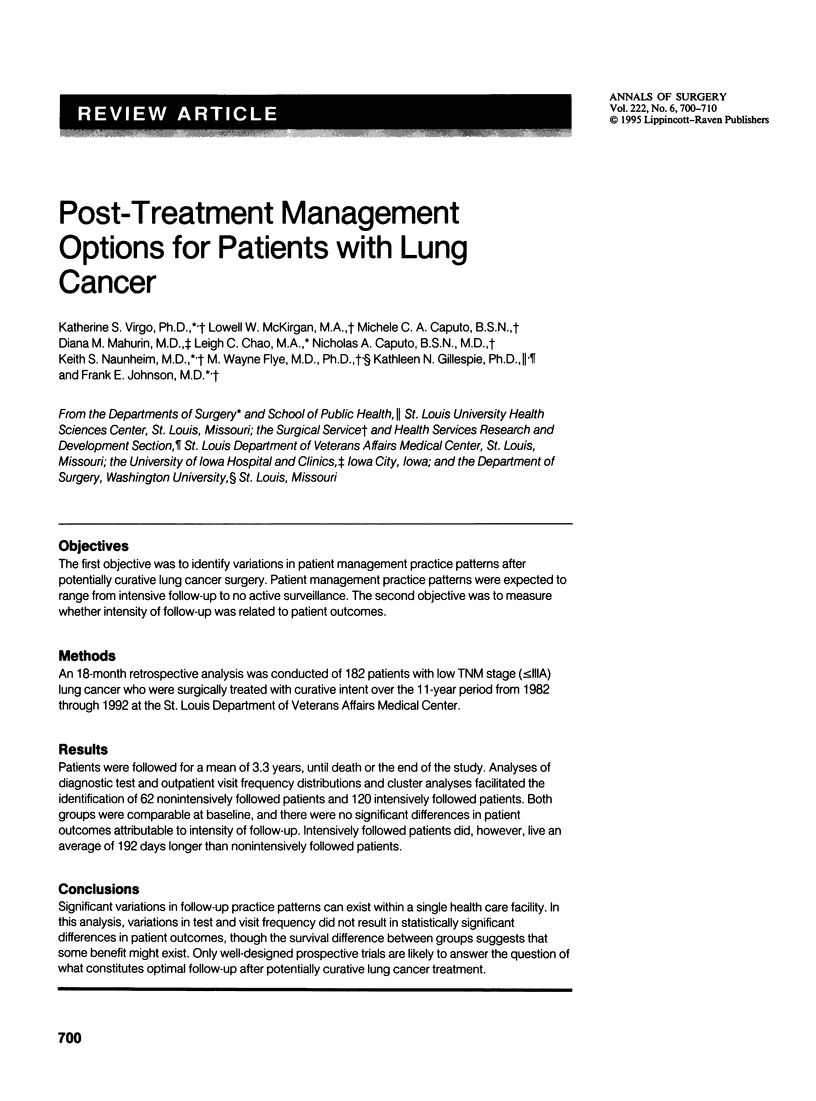
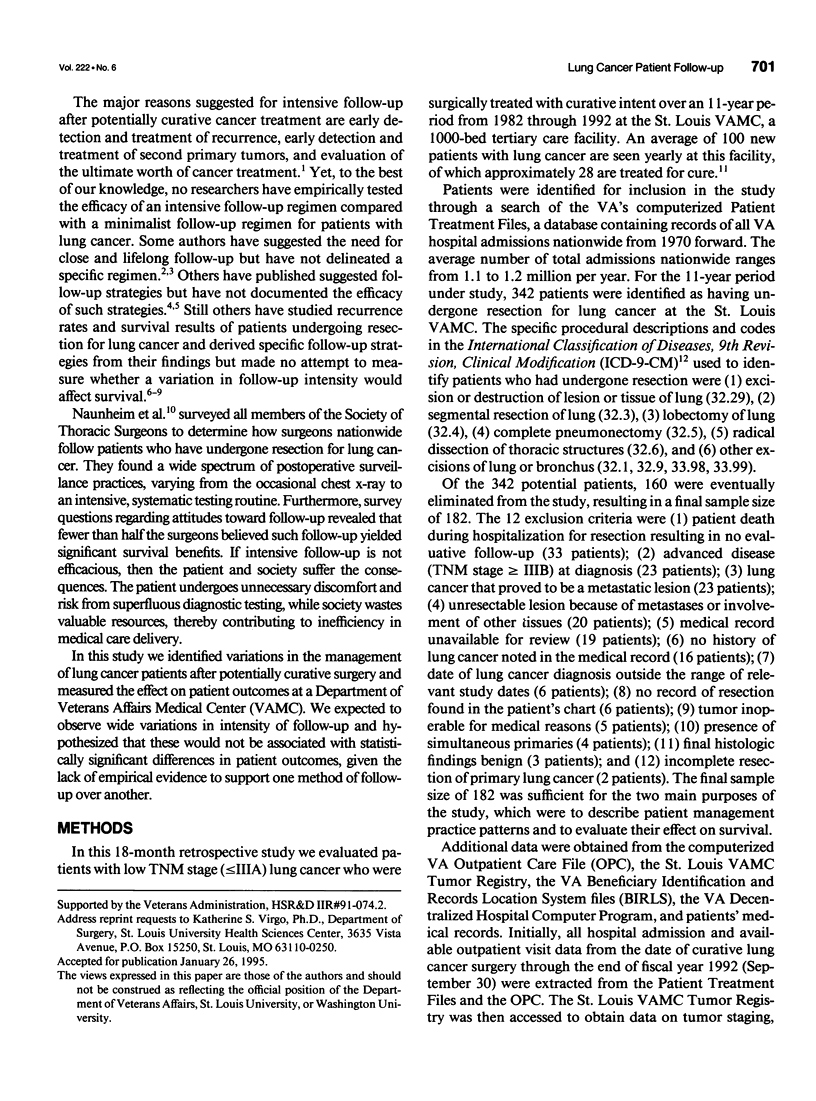
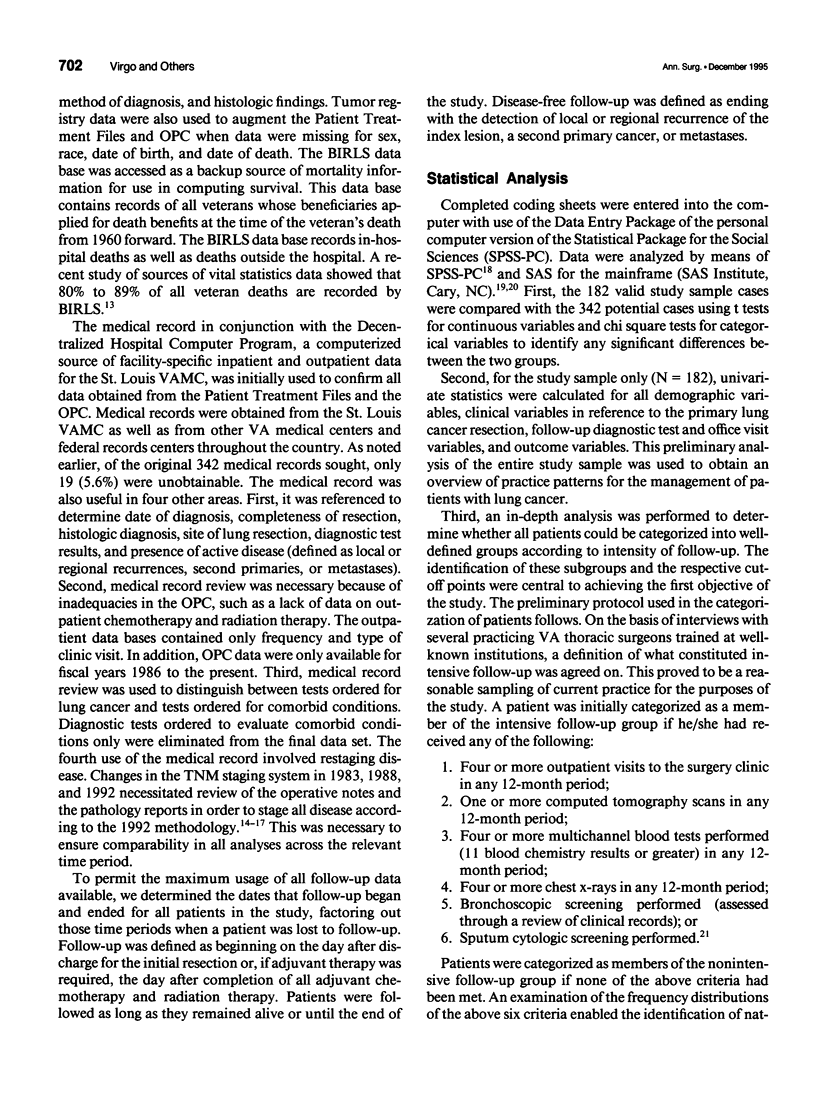
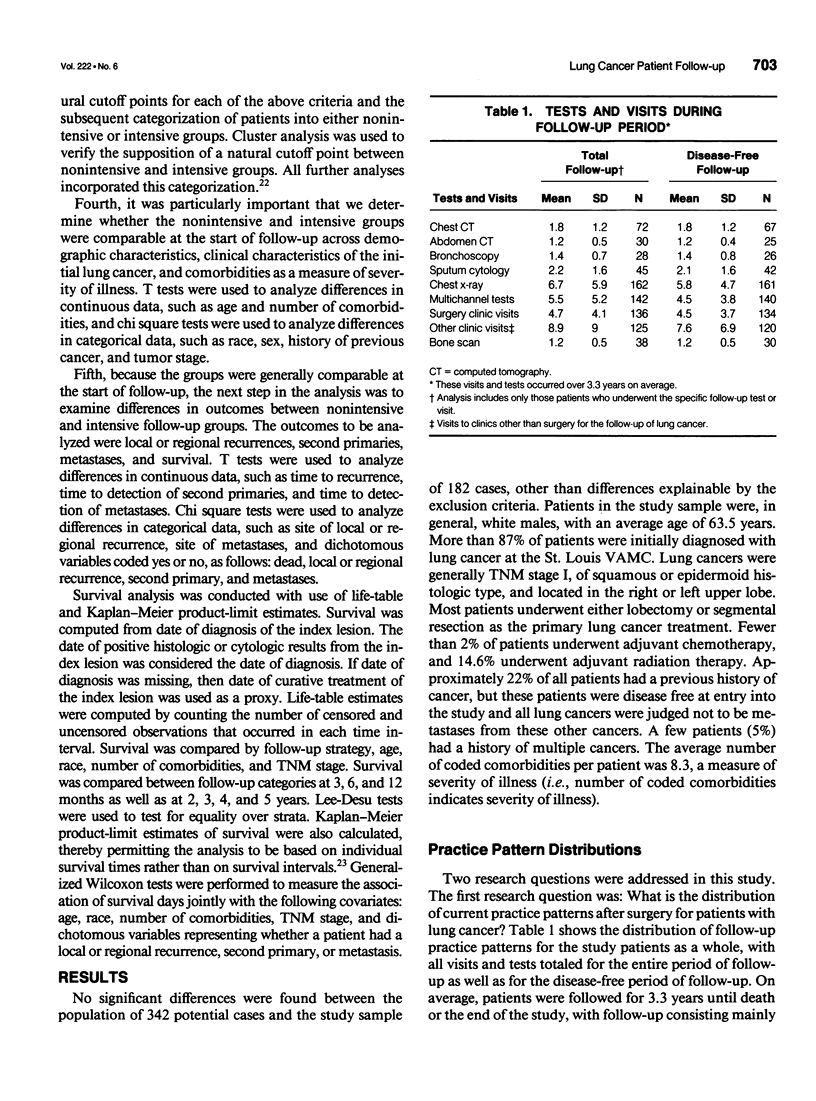

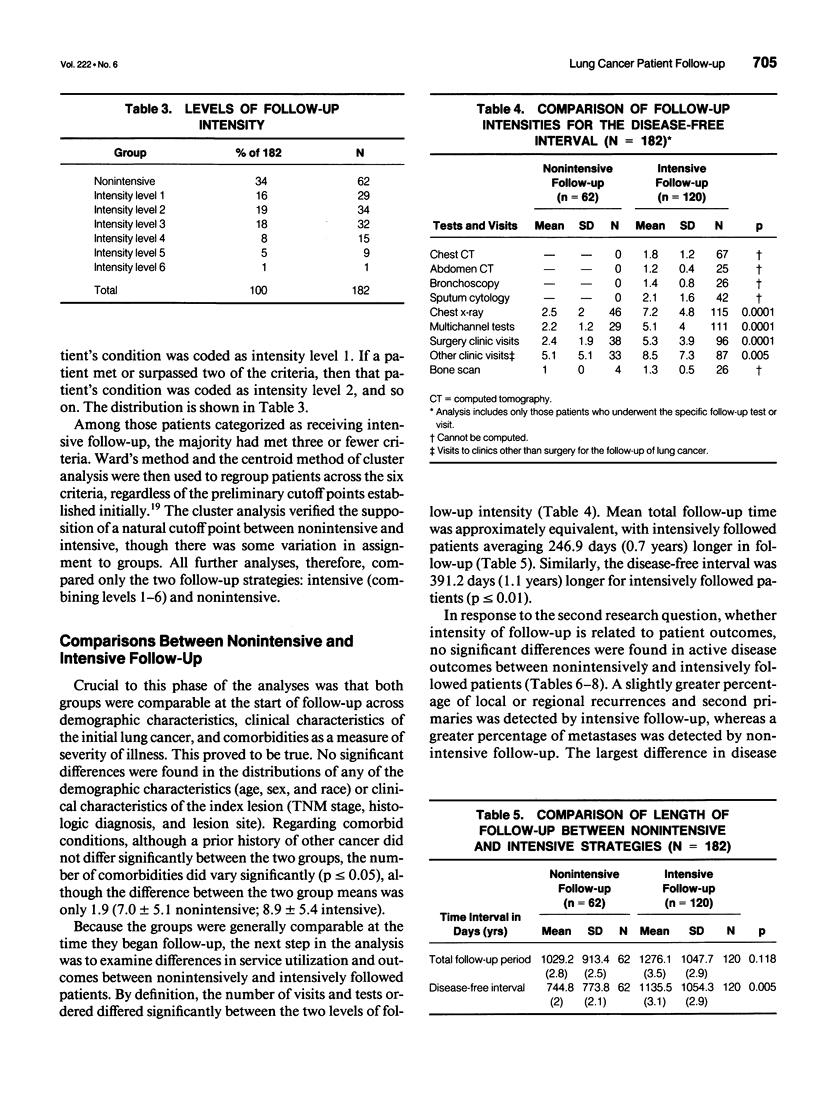
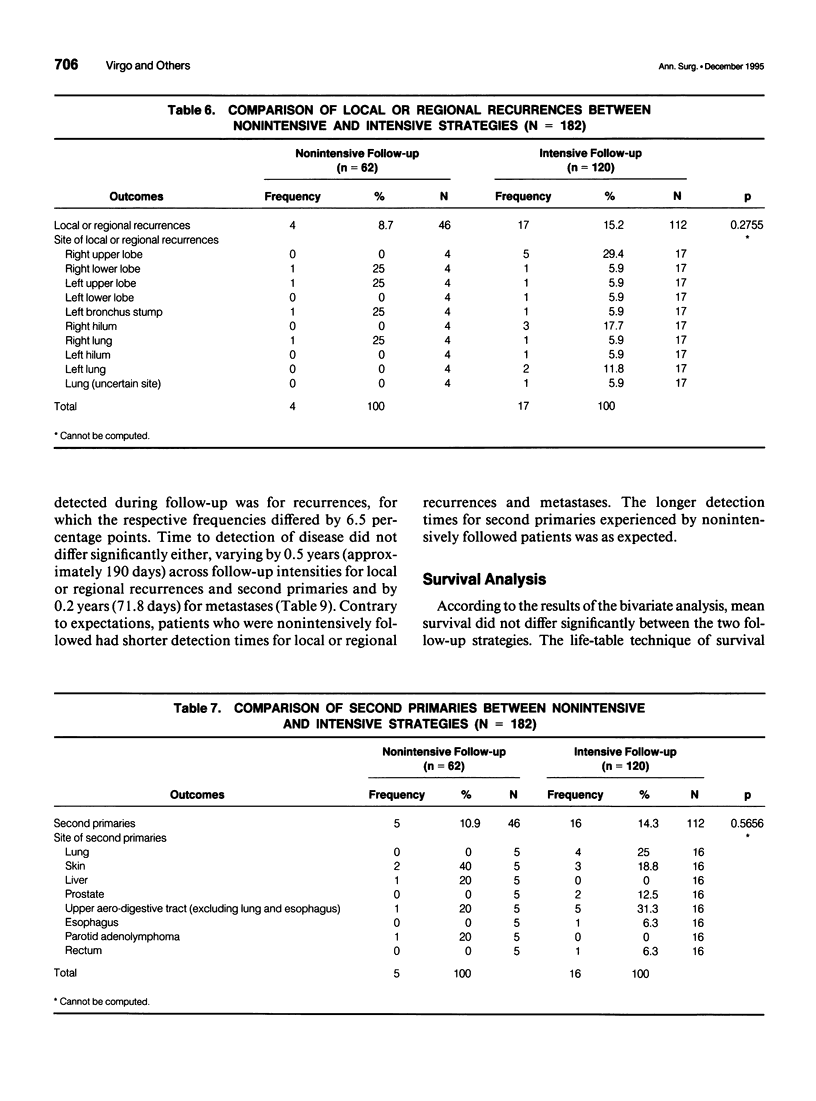
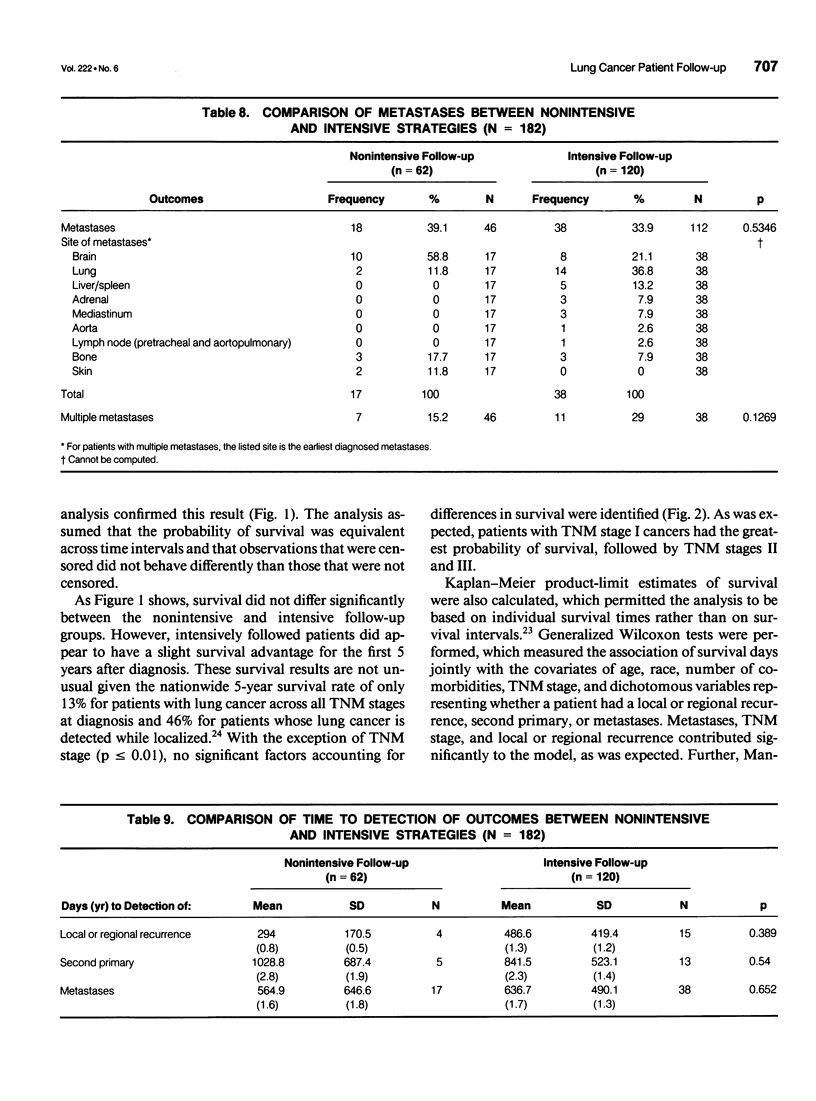
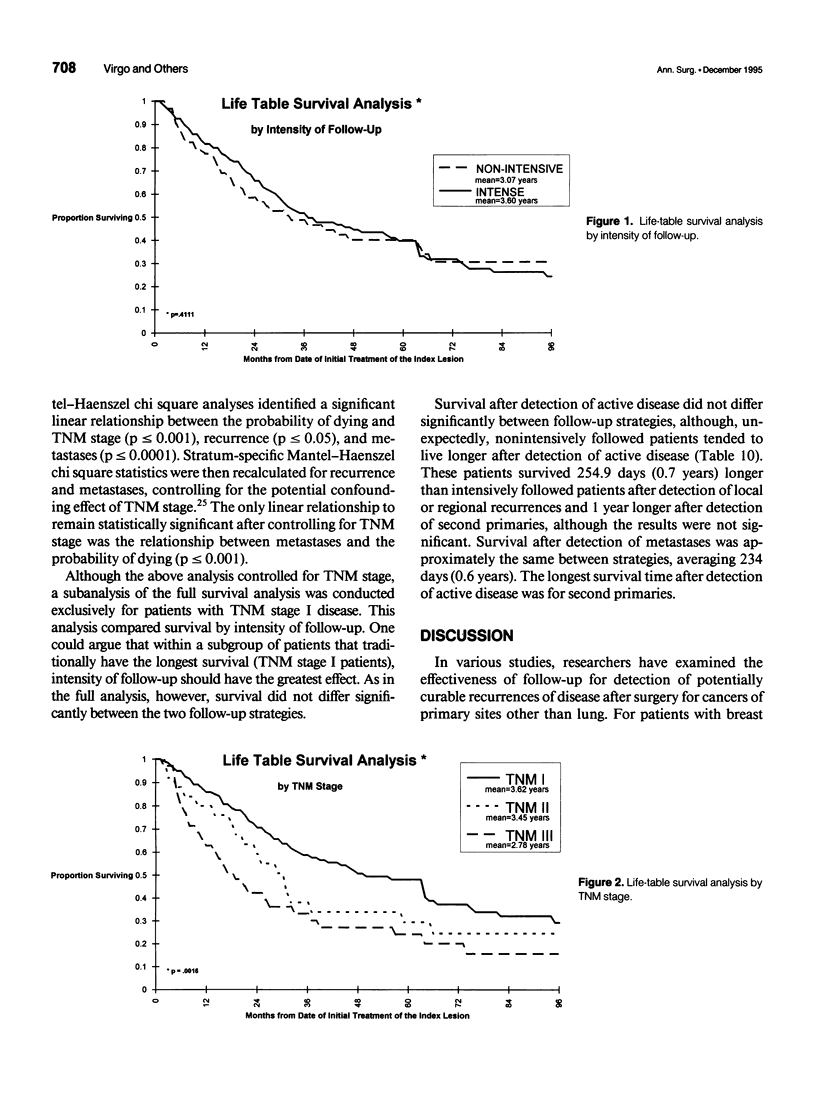
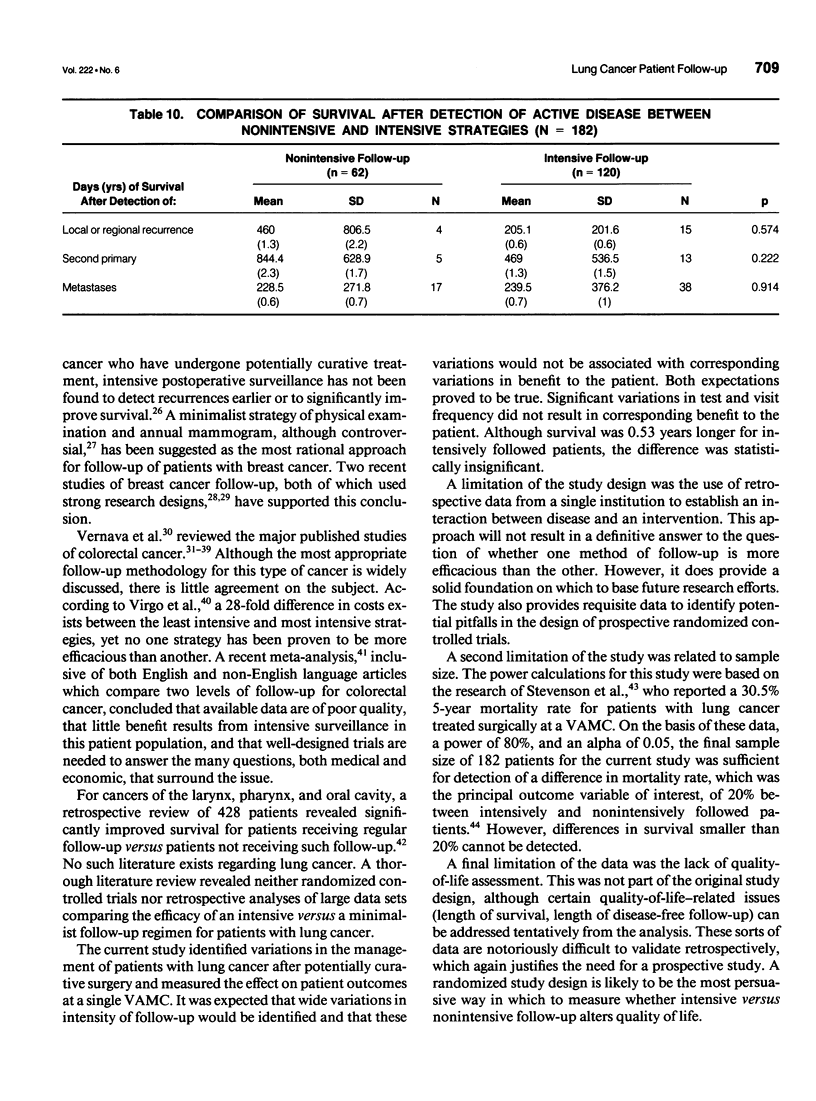
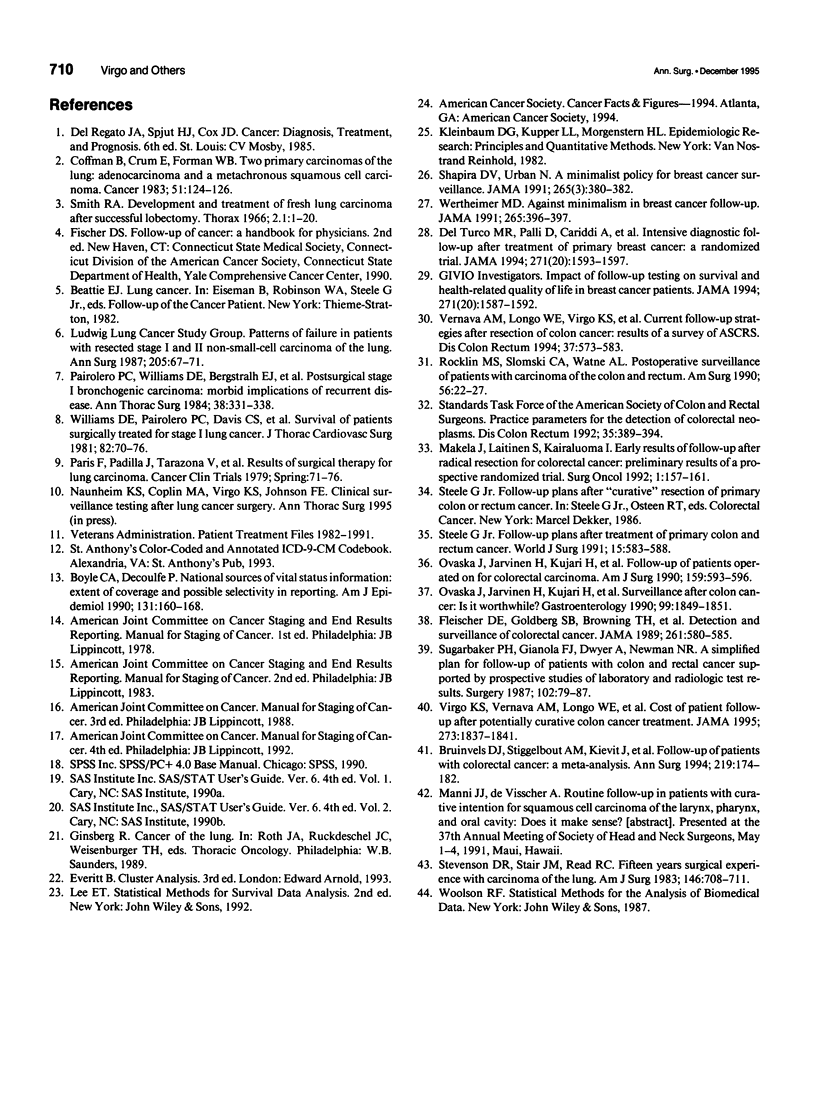
Selected References
These references are in PubMed. This may not be the complete list of references from this article.
- Boyle C. A., Decouflé P. National sources of vital status information: extent of coverage and possible selectivity in reporting. Am J Epidemiol. 1990 Jan;131(1):160–168. doi: 10.1093/oxfordjournals.aje.a115470. [DOI] [PubMed] [Google Scholar]
- Bruinvels D. J., Stiggelbout A. M., Kievit J., van Houwelingen H. C., Habbema J. D., van de Velde C. J. Follow-up of patients with colorectal cancer. A meta-analysis. Ann Surg. 1994 Feb;219(2):174–182. doi: 10.1097/00000658-199402000-00009. [DOI] [PMC free article] [PubMed] [Google Scholar]
- Coffman B., Crum E., Forman W. B. Two primary carcinomas of the lung: adenocarcinoma and a metachronous squamous cell carcinoma. A case report and review of the literature. Cancer. 1983 Jan 1;51(1):124–126. doi: 10.1002/1097-0142(19830101)51:1<124::aid-cncr2820510125>3.0.co;2-9. [DOI] [PubMed] [Google Scholar]
- Fleischer D. E., Goldberg S. B., Browning T. H., Cooper J. N., Friedman E., Goldner F. H., Keeffe E. B., Smith L. E. Detection and surveillance of colorectal cancer. JAMA. 1989 Jan 27;261(4):580–585. [PubMed] [Google Scholar]
- Gerdes H. Surveillance after colon cancer: is it worthwhile? Gastroenterology. 1990 Dec;99(6):1849–1851. doi: 10.1016/0016-5085(90)90504-t. [DOI] [PubMed] [Google Scholar]
- Mäkelä J., Laitinen S., Kairaluoma M. I. Early results of follow-up after radical resection for colorectal cancer. Preliminary results of a prospective randomized trial. Surg Oncol. 1992 Apr;1(2):157–161. doi: 10.1016/0960-7404(92)90029-k. [DOI] [PubMed] [Google Scholar]
- Ovaska J., Järvinen H., Kujari H., Perttilä I., Mecklin J. P. Follow-up of patients operated on for colorectal carcinoma. Am J Surg. 1990 Jun;159(6):593–596. doi: 10.1016/s0002-9610(06)80074-7. [DOI] [PubMed] [Google Scholar]
- Pairolero P. C., Williams D. E., Bergstralh E. J., Piehler J. M., Bernatz P. E., Payne W. S. Postsurgical stage I bronchogenic carcinoma: morbid implications of recurrent disease. Ann Thorac Surg. 1984 Oct;38(4):331–338. doi: 10.1016/s0003-4975(10)62281-3. [DOI] [PubMed] [Google Scholar]
- Paris F., Padilla J., Tarazona V., Blasco E., Canto A., Pastor J., Zarza A. G. Results of surgical therapy for lung carcinoma. Cancer Clin Trials. 1979 Spring;2(1):71–76. [PubMed] [Google Scholar]
- Rocklin M. S., Slomski C. A., Watne A. L. Postoperative surveillance of patients with carcinoma of the colon and rectum. Am Surg. 1990 Jan;56(1):22–27. [PubMed] [Google Scholar]
- Rosselli Del Turco M., Palli D., Cariddi A., Ciatto S., Pacini P., Distante V. Intensive diagnostic follow-up after treatment of primary breast cancer. A randomized trial. National Research Council Project on Breast Cancer follow-up. JAMA. 1994 May 25;271(20):1593–1597. doi: 10.1001/jama.271.20.1593. [DOI] [PubMed] [Google Scholar]
- Schapira D. V., Urban N. A minimalist policy for breast cancer surveillance. JAMA. 1991 Jan 16;265(3):380–382. [PubMed] [Google Scholar]
- Steele G., Jr Follow-up plans after treatment of primary colon and rectum cancer. World J Surg. 1991 Sep-Oct;15(5):583–588. doi: 10.1007/BF01789202. [DOI] [PubMed] [Google Scholar]
- Stevenson D. R., Stair J. M., Read R. C. Fifteen years surgical experience with carcinoma of the lung. Am J Surg. 1983 Dec;146(6):708–711. doi: 10.1016/0002-9610(83)90323-9. [DOI] [PubMed] [Google Scholar]
- Sugarbaker P. H., Gianola F. J., Dwyer A., Neuman N. R. A simplified plan for follow-up of patients with colon and rectal cancer supported by prospective studies of laboratory and radiologic test results. Surgery. 1987 Jul;102(1):79–87. [PubMed] [Google Scholar]
- Vernava A. M., 3rd, Longo W. E., Virgo K. S., Coplin M. A., Wade T. P., Johnson F. E. Current follow-up strategies after resection of colon cancer. Results of a survey of members of the American Society of Colon and Rectal Surgeons. Dis Colon Rectum. 1994 Jun;37(6):573–583. doi: 10.1007/BF02050993. [DOI] [PubMed] [Google Scholar]
- Virgo K. S., Vernava A. M., Longo W. E., McKirgan L. W., Johnson F. E. Cost of patient follow-up after potentially curative colorectal cancer treatment. JAMA. 1995 Jun 21;273(23):1837–1841. [PubMed] [Google Scholar]
- Wertheimer M. D. Against minimalism in breast cancer follow-up. JAMA. 1991 Jan 16;265(3):396–397. [PubMed] [Google Scholar]
- Williams D. E., Pairolero P. C., Davis C. S., Bernatz P. E., Payne W. S., Taylor W. F., Uhlenhopp M. A., Fontana R. S. Survival of patients surgically treated for stage I lung cancer. J Thorac Cardiovasc Surg. 1981 Jul;82(1):70–76. [PubMed] [Google Scholar]


